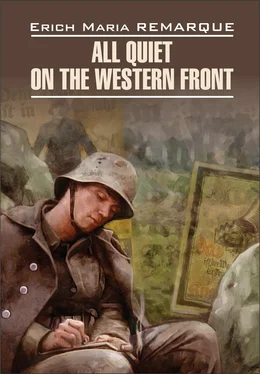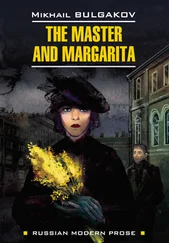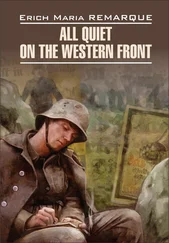We have won.
The hospital inspector turns up at midday and bawls us out. He threatens us with the clink, and worse. Now military hospital inspectors, just like commissariat officers, are, it is true, entitled to a sword and pips on their shoulders, but really they are just administrators, so not even recruits take them for proper officers. And so we let him talk away. What can they do to us —?
‘Who threw the bottle?’ he asks.
Before I have time to wonder whether I should own up, someone says, ‘I did.’
A man with a stubble of beard sits up in bed. Everyone wonders why he has taken the blame.
‘It was you?’
‘Correct. I became over-excited because we were wakened unnecessarily, and I lost control, so that I was not responsible for my actions.’ He talks like a book.
‘Name?’
‘Josef Hamacher, Supplementary Reserve [246] Supplementary Reserve – дополнительный резерв
.’
The inspector leaves.
We are all curious. ‘What on earth did you own up for? It wasn’t you at all!’
He grins. ‘It doesn’t matter. I’ve got a Special Permit.’
Everyone knows what he means, of course. If you have a Special Permit, you can do anything.
‘Yes,’ he explains. ‘I got a head wound, and when that happened they made out a document saying that I might not be responsible for my actions from time to time. Ever since then I’ve had a good time. No one is allowed to get me worked up. So nothing will happen to me. He’ll get pretty angry down there when he finds out. And I owned up because I enjoyed the bottlethrowing. If they leave the door open tomorrow, we’ll chuck another one.’
We couldn’t be happier. As long as we’ve got Josef Hamacher, we can try anything on.
Then the silent, flat hospital trolleys come to fetch us.
Our bandages are stuck. We bellow like cattle.
There are eight men in our room. Peter, who has black curly hair, is the one with the most serious wound, a lung injury with complications. Franz Waechter, next to him, has a bullet wound in his arm which did not look too bad at first. But during the third night he calls out to us to ring for help, because he thinks he has begun to haemorrhage.
I ring violently. The night sister doesn’t come. Earlier in the evening we were all pretty demanding of her, because our dressings had all been changed, and so we were suffering. One of us wanted his leg put this way, another of us wanted it that way, a third wanted some water, the fourth needed his pillow plumped up. Eventually the fat old nurse had grumbled crossly and closed the doors on us. Now she probably suspects that it will be the same sort of thing, because she doesn’t come.
We wait. Then Franz says, ‘Ring again.’
I do it. There is still no sign of her. There is only the one ward sister on our wing at night, and perhaps she is busy in one of the other rooms. ‘Are you sure you are bleeding, Franz?’ I ask. ‘If not, they’ll be down on us like a ton of bricks again.’
‘It’s wet. Can’t anyone put the light on?’
We can’t manage that, either. The switch is by the door and nobody can get out of bed. I press the bell until I can’t feel my thumb any more. Maybe the nurse has nodded off. They really have a lot to do and they are all overworked, even during the day. And they have all those prayers to say.
‘Should we chuck a few bottles?’ asks Josef Hamacher, the one with the Special Permit.
‘She’s even less likely to hear that than the bell.’
At last the door opens. The old girl appears, looking sulky.
When she sees what is up with Franz she gets a move on, and shouts at us, ‘Why didn’t any of you call me?’
‘We did ring. None of us can walk.’
He has lost a lot of blood and is bandaged up. In the morning we notice how his face has become sharper and more yellow, while last night he still looked almost healthy. A nurse comes round more often now.
We often get volunteer auxiliary nurses from the Red Cross. They are well meaning, but they can be a bit on the clumsy side. When they re-make our beds they often hurt us, and then they are so shaken that they hurt us even more.
The nuns are more reliable. They know how to get hold of us, but we would really prefer them to be more cheerful. Some of them do have a good sense of humour, it’s true, and those are great. There is no one who wouldn’t do anything in the world for Sister Tina, a wonderful nurse, who cheers up the whole wing, even when we can only see her from a distance. And there are a few more like her. We’d go through hell and high water for them. We really can’t complain – you get treated like a civilian by the nuns here. On the other hand, when you think of the garrison hospitals, then you really start to worry.
Franz Waechter doesn’t regain his strength. One day he is taken out and doesn’t come back. Josef Hamacher knows what has happened. ‘We won’t see him again. He’s been taken to the Dead Man’s Room.’
‘What Dead Man’s Room?’
‘You know, the Dying Room —’
‘What’s that?’
‘The small room at the corner of this wing. Anybody who is about to snuff it gets taken there. There are two beds. It’s called the Dying Room all over the hospital.’
‘But why do they do that?’
‘So they don’t have so much work afterwards. It’s easier, too, because it’s right by the entrance to the mortuary. Maybe they want to make sure that nobody dies on the wards, and do it so as not to upset the others. They can keep an eye on a man better, too, if he is in there on his own.’
‘What about the man himself?’
Josef shrugs. ‘Usually he is past noticing much any more.’
‘Does everyone know about this?’
‘Anyone who has been here for a while finds out, of course.’
That afternoon Franz Waechter’s bed is made up again. After a couple of days they come and take the new man away. Josef indicates with his hand where he is going. We watch a good few more come and go.
Relatives often come and sit by the beds crying, or talking softly and shyly. One old lady is very reluctant to leave, but she can’t stay there all night, of course. She comes back very early on the following morning, but not quite early enough; because when she goes up to the bed there is already somebody new in it. She has to go to the mortuary. She gives us the apples that she had brought with her.
Little Peter is getting worse, too. His temperature chart looks bad, and one day a flat hospital trolley is put beside his bed. ‘Where am I going?’ he asks.
‘To have your dressings done.’
They lift him on to the trolley. But the nurse makes the mistake of taking his battledress tunic from its hook and putting it on the trolley with him, so that she doesn’t have to make two journeys. Peter realizes at once what is going on and tries to roll off the trolley. ‘I’m staying here!’
They hold him down. He cries out weakly with his damaged lung, ‘I don’t want to go to the Dying Room.’
‘But we’re going to the dressing ward.’
‘Then why do you need my tunic?’ He can’t speak any more. Hoarse and agitated, he whispers, ‘Want to stay here.’
They don’t answer, and move him out. By the door he tries to sit up. His head of black curls is bobbing, his eyes are full of tears. ‘I’ll be back! I’ll be back!’ he shouts.
The door closes. We are all rather worked up, but nobody says anything. Eventually Josef says, ‘Plenty of them have said that. But once you are in there you never last.’
They operate on me and I puke for two whole days. My bones don’t seem to want to knit properly, says the doctor’s clerk. There’s another man whose bones grow together badly and he has to have them broken again. It’s all pretty wretched.
Читать дальше
Конец ознакомительного отрывка
Купить книгу












